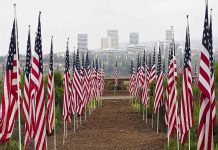“My dog has fleas…”
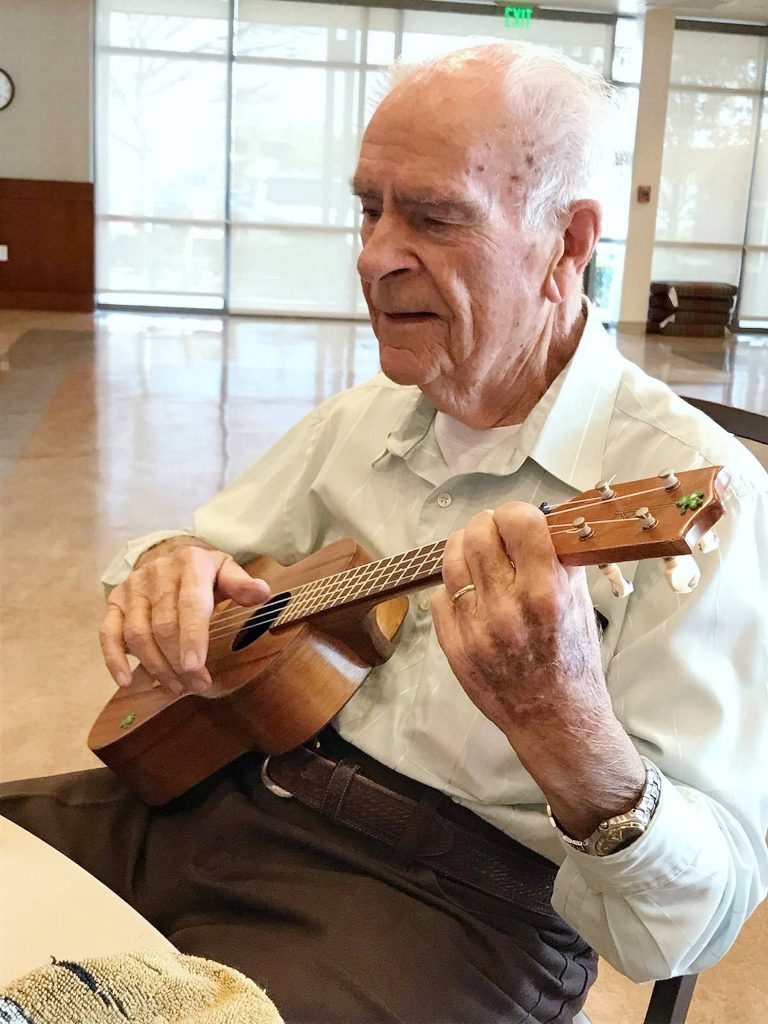
— Photo by Richard Simon ©
However, scratch any inkling of an itchy pooch from your caring minds.
This happens to be the lyric most ukulele players first learn when tuning their four-stringed instruments.
It also happens to be the warm-up line “sung” and strummed by up to 60 members of the 106-member Ukulele Club at OASIS Senior Center in Corona del Mar as they tune up for their regular 90-minute, Monday afternoon musical jams.
Talk about longevity, not only of the club’s members, but of the club itself: The Ukulele Club has been “picking” along with nary a meeting missed for more 40 years.
Virtually all of its members attribute the group’s success to 98-year-old Tony Cappa, who recently stepped down from his presidential post after 28 years of leadership – leadership perhaps partially forged as a Marine who fought in the Battle of Iwo Jima during World War II.
Cappa and the club were honored by Mayor Will O’Neill at a Newport Beach City Council meeting in December.
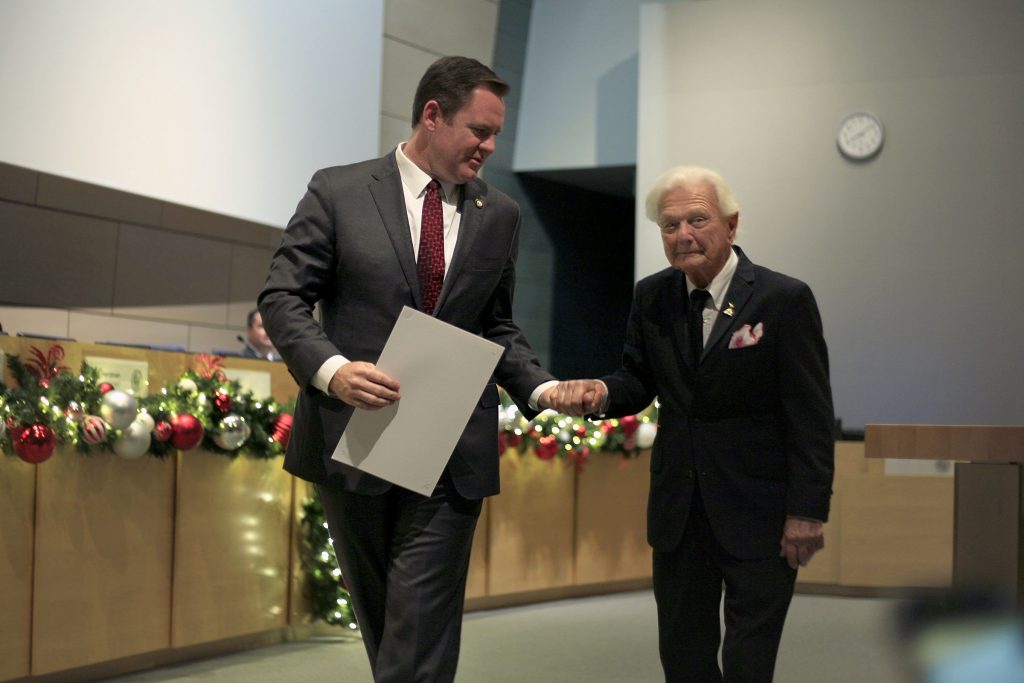
— Photo by Sara Hall ©
“Say I’m sad, say I’m weary; say that health and wealth have passed me. Say I’m old. Then add this: My uke has blessed me,” Cappa said at the December meeting. “Yes, it has.”
While most believe the ukulele’s DNA is Hawaiian, in fact it originated in Portugal, and was brought over by Portuguese immigrants during the 19th century.
Called a “machete” in Portuguese, the Hawaiian moniker, ukulele, means “jumping flea,” probably referencing the quick-dancing fingers of the instrumentalists. An 1897 story in the “Hawaiian Gazette” reported that “Madeira Islanders recently arrived here, have been delighting the people with nightly street concerts.”
Likewise, members of the Ukulele Club for 30 years have been periodically delighting Newport residents with their talents at various venues, like the CdM Christmas Walk, local assisted living homes and various philanthropic organizations.
“We try to perform every six weeks for whoever wants us,” said 82-year-old co-group leader Tim Ogawa.
Even though he’s been playing since he was a teenager and joined the group in 2011, Ogawa said he’s learned a lot through the OASIS club.
Another longtime ukulelist, Charles McCarthy, 88, learned to play the instrument in 1954 while serving with the Navy in Hawaii.
“Everybody there played the ukulele,” he recounted. “If you were in Hawaii, that’s what you did.”
Co-group leader Mike Ekinaka, 76, admitted that there are a few age-related impairments among the members. His index finger doesn’t want to cooperate on the strings, so he lets the middle finger take up the slack.
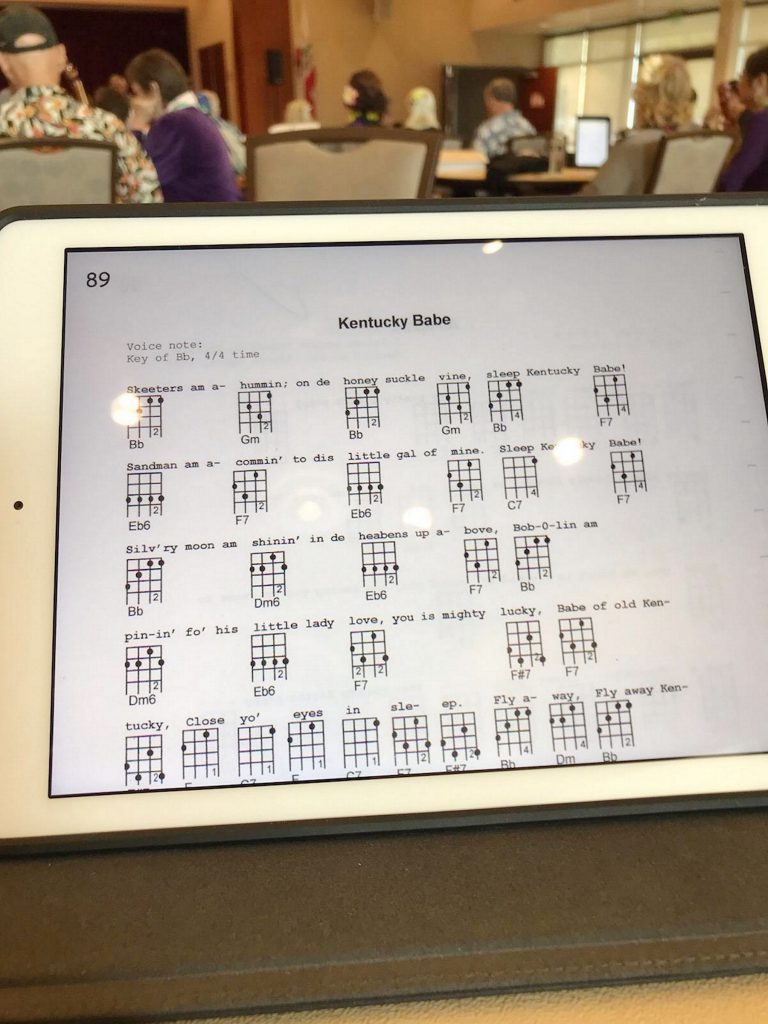
— Photo by Richard Simon ©
“Many people have arthritis, so they just work around it; some people just tap along,” he said.
Others live with some hearing impairment, so tuning the uke is often done in tandem with inexpensive, battery-powered portable tuners.
“We can screw up all we want, because when all of us play, you can’t hear the mistakes,” Cappa said.
Around 25% percent of the members live in Newport Beach, the rest drive in (or are driven) from Irvine, Costa Mesa and Laguna. There is no membership fee.
Ekinaka shared that of the approximately 45 members in attendance on a normal meeting day, about half are beginners.
“You can learn to play in five minutes,” Ogawa said.
A budding uke player needn’t know how to read music to play the ukulele, they all agreed, since all of their song books use chord diagrams, which are printed above the lyrics. A chord diagram is simply a box with vertical and horizontal lines that show players where to place their fingers according to the dots laid down inside the box. Most players strum the chords, while a few can actually and artistically pluck the melodies.
Ogawa and Ekinaka select the songs to be played at every meeting, choosing from about 750 songs from three books. They email the choices out to the club members; some practice, some don’t.
“We all have our favorite songs,” Cappa noted.
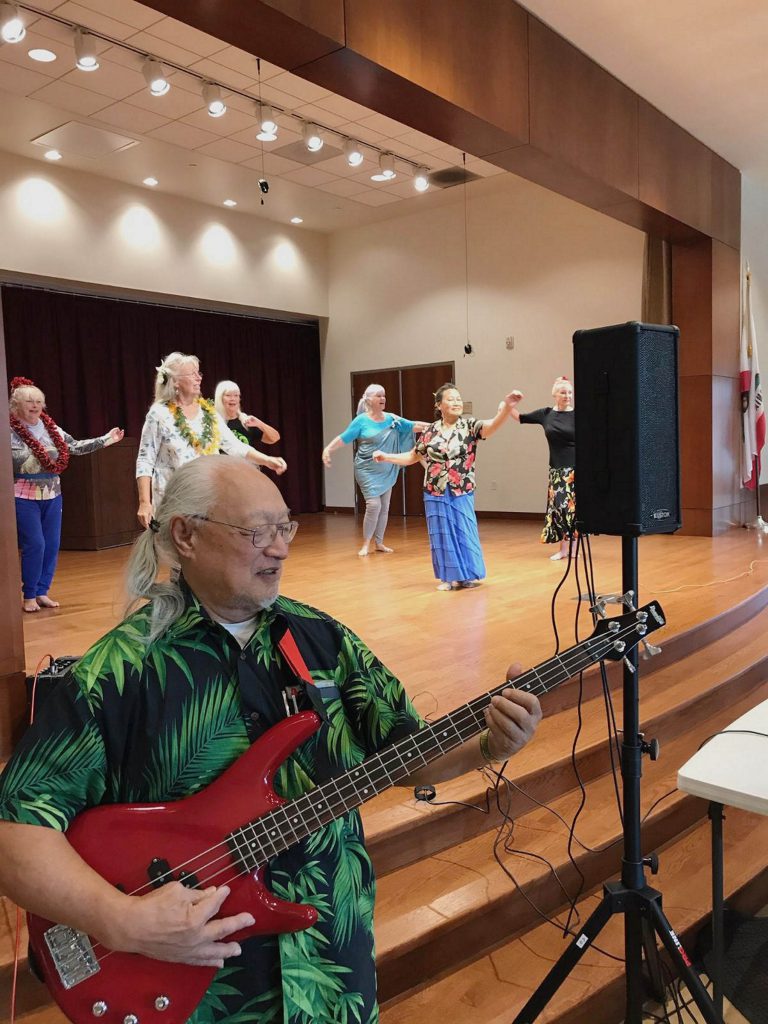
— Photo by Richard Simon ©
Like cars, ukuleles run the price gamut. Plastic beginner’s ukes might cost $100. The Bentley of ukuleles would be the Kamaka brand, which can leave the music store showroom for a lofty $1,500. The Rolls Royce label goes to the Martin models, which will lighten the wallet by at least $2,000. One unnamed ukulele was bought at the recent Oasis rummage sale for $500. And that’s where great deals and finds can be found.
The Ukulele Club’s two objectives are: Musicality and camaraderie, Ogawa said.
“It offers self-expression, and a joy of playing with other people and singing with them,” he said.
“The social part is very important, and it’s a tribute to Tony [Cappa] who encouraged interaction” beyond playing, Ekinaka added.
Despite the senior ages at OASIS, there’s no doubt that all the members of the Ukulele Club, no matter their experience, demonstrate true pluck in its most fundamental definition.
Contact the writer at Pleasepitchrich@yahoo.com




